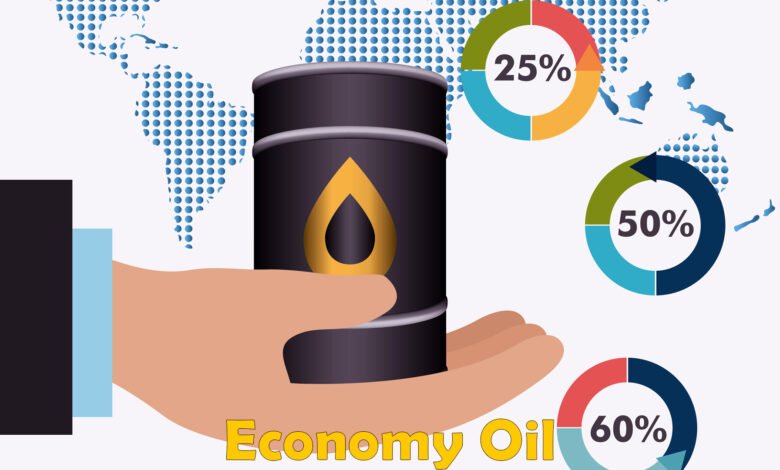Crude Oil Prices and Economy Oil: Understanding Market Dynamics and Service Impacts in 2024

Crude oil, frequently referred to as “black gold,” is an important thing of the global economic system. It fuels transportation, powers industries, and influences the charge of countless goods. Its price fluctuations are closely monitored by means of agencies, governments, and consumers alike, as shifts in oil costs can cause vast financial adjustments. Additionally, agencies that rely closely on oil, including Economy Oil services, are at once impacted via these fluctuations. In this newsletter, we will explore the elements that impact crude oil fees, their impact on international economies, and the way organizations like Economy Oil adapt to those modifications.
What is Crude Oil?
Crude oil is a clearly going on fossil gasoline composed of hydrocarbon deposits and organic substances. It can be made into numerous products like gas, diesel, kerosene, and plastics, making it one of the most flexible and important sources for contemporary civilization.
Types of Crude Oil
The two number one forms of crude oil are Brent Crude and WTI (West Texas Intermediate). These two are taken into consideration in international benchmarks for pricing. Brent crude is commonly extracted from oil fields within the North Sea, whilst WTI comes from U.S. Oil fields. Brent crude is frequently considered as worldwide wellknown, with its rate typically better than WTI due to differences in refining costs and transportation.
Crude Oil Price Trends in 2024
Crude oil prices were risky, reflecting both supply-demand dynamics and worldwide geopolitical activities. As of 2024, the charge of WTI crude oil stands at around $81.Fifty four per barrel, while Brent crude is priced at $86.99 in keeping with barrel. These prices are concerned with everyday fluctuations, regularly responding to real-time events like political trends, economic sanctions, or modifications in production quotas via essential oil-generating nations.
Historical Price Insights
Looking again, crude oil prices have experienced dramatic shifts over the last decade. In 2020, as an example, a sharp decline passed off when WTI prices in short plunged below $0 in line with barrel during the COVID-19 pandemic. This exceptional occasion turned into a call for fall apart and a delivery glut, illustrating the volatility of oil markets. Prices have since recovered, but the pandemic highlighted the sensitivity of oil markets to both economic and health crises.
Factors Influencing Crude Oil Prices
Global Supply and Demand
Oil prices are often decided by way of stability among global supply and demand. When demand exceeds supply, fees upward thrust, and whilst delivery outpaces demand, charges fall. For example, international oil intake surged as economies recovered from COVID-19, mainly to rate hikes in 2022 and 2023. Conversely, when oil-producing countries, mainly the ones inside OPEC, decide to boom production, charges often fall.
Geopolitical Events
Geopolitical elements play a great role in oil charge fluctuations. Conflicts in key oil-producing areas such as the Middle East can result in disruptions in oil supplies, driving prices higher. The Russian invasion of Ukraine in 2022, for instance, caused international oil rate spikes due to sanctions on Russian oil exports.
Technological Advances and Alternative Energy
Technological improvements in power extraction and manufacturing, together with hydraulic fracturing (fracking), have significantly expanded the delivery of oil, especially inside the U.S., mainly to decrease fees within the past. However, the developing adoption of renewable power sources and electric cars (EVs) presents a protracted-term venture to oil demand. As countries push closer to reducing carbon emissions, the demand for oil could decline, affecting expenses and the global oil enterprise.

Economic Implications of Crude Oil Prices
Inflation and Consumer Prices
Crude oil fees have a right away effect on client goods, particularly gas. When oil costs rise, the cost of fuel, diesel, and home heating oil will increase, contributing to inflation. For instance, higher crude oil charges in 2022 drove gasoline charges to over $5 in line with a gallon inside the U.S., inflicting big economic strain.
Global Economic Health
Oil price shocks—sudden and sharp increases or decreases in oil charges—can destabilize the global financial system. High oil costs can cause inflation, leading critical banks to elevate hobby prices, which slows monetary growth. On the alternative hand, oil-uploading nations can also face intense economic deficits while crude charges surge.
Countries that are principal oil exporters, like Saudi Arabia and Russia, gain from excessive oil fees as they see a boost in revenue. However, the identical charge will increase and can lead to economic difficulties for oil-importing nations, including India and Japan, which can be closely reliant on oil.
The Role of Economy Oil Services in Energy Markets
Overview of Economy Oil Services
Economy Oil services provide low-cost heating oil to residential and business customers. These services are mainly important in regions that depend upon heating oil as a primary energy supply at some point of the winter months. Companies like Economy Oil Change attention to competitive pricing techniques to provide customers with price-effective answers.
Pricing Models and Consumer Savings
Economy Oil offers bendy pricing models, such as fixed-charge contracts and budget plans, to help consumers manage fluctuating heating oil charges. By permitting clients to fasten in fees in the course of the off-top season or spread out bills over the yr, Economy Oil guarantees that families are less prone to fee spikes for the duration of the less warm months.
The Impact of Crude Oil Prices on Heating Oil Costs
Crude oil fees and heating oil fees are intently connected. When the charge of crude oil rises, heating oil prices observe a match. In 2024, the average rate of heating oil stands at about $2.68 in step with the gallon, reflecting the recent increase in crude oil expenses. Homeowners and companies that depend on heating oil are mainly affected by these fluctuations, mainly during top winter months whilst demand is highest.
Seasonal Variability in Heating Oil Prices
Heating oil prices generally tend to grow in the wintry weather because of better demand, specifically in the northeastern United States. However, companies like Economy Oil mitigate this with the aid of providing early purchase programs and finance payment plans, permitting purchasers to purchase oil at decrease fees in advance.
Future Outlook for Crude Oil Prices
Predictions for 2024-2025
Looking ahead, oil expenses are predicted to stay risky due to continued geopolitical tensions and moving electricity regulations internationally. According to analysts, oil fees ought to rise in 2024 if worldwide demand keeps to outstrip delivery, particularly if OPEC maintains manufacturing cuts.
However, the push toward renewable power resources and extended strength performance may additionally steadily reduce global oil demand. As nations undertake stricter climate rules and sell the usage of electric vehicles, the demand for crude oil may want to decrease, doubtlessly stabilizing or maybe lowering fees within the long term.

FAQs
-
How are crude oil expenses decided?
Crude oil fees are decided with the aid of the global balance among delivery and demand. Factors including production degrees set by way of OPEC, geopolitical events, and technological improvements in power production additionally play a function.
-
What is the difference between WTI and Brent crude oil?
WTI (West Texas Intermediate) is typically used as a benchmark in North America, whilst Brent crude serves as the global benchmark. Brent crude prices are typically better because of transportation and extraction expenses.
-
How do crude oil costs have an impact on customer fuel prices?
When crude oil costs increase, the cost of manufacturing gasoline, diesel, and domestic heating oil additionally rises, fundamental to better prices for consumers on the pump and in their houses.
-
How does Economy Oil provide aggressive heating oil expenses?
Economy Oil offers competitive heating oil expenses by means of leveraging bulk purchasing, lengthy-time period contracts, and patron-friendly pricing models like finance plans and fixed-price contracts.
-
What is the destiny of oil expenses in terms of renewable strength?
As renewable strength assets end up greater good sized and countries undertake easy electricity rules, the call for oil may additionally steadily decline, mainly to capability stabilization or decreases in oil costs.
Conclusion
Crude oil remains an important element of the global economic system, influencing the entirety from consumer charges to geopolitical techniques. By know-how the elements that have an effect on oil charges, consumers and agencies can better navigate the complexities of energy markets and make knowledgeable decisions. As the arena transitions toward renewable energy, the lengthy-term future of oil remains unsure, however its importance within the present is simple.
Keep an eye for more news & updates on Evolant Agency!




